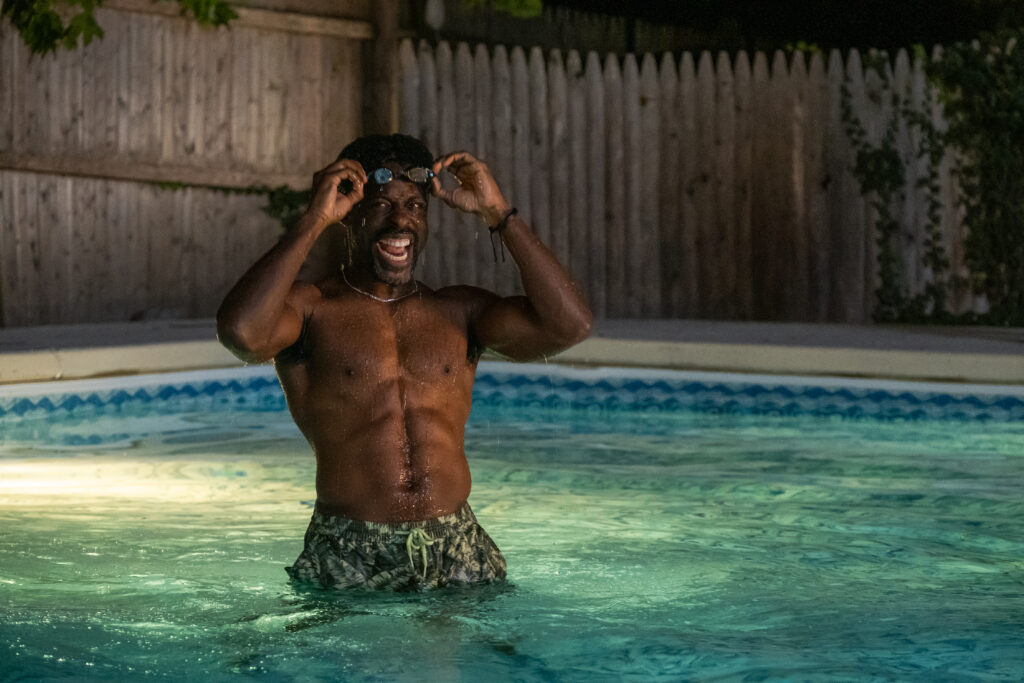November 2, 2023
by Carla Hay

Directed by Cord Jefferson
Culture Representation: Taking place in Los Angeles and in Massachusetts, the comedy/drama film “American Fiction” (based on the novel “Erasure”) features an African American and white cast of characters (with a few Latinos) representing the working-class and middle-class.
Culture Clash: An author/professor, who happens to be African American, creates a fake persona as a fugitive criminal to write a book that has racially demeaning stereotypes of African Americans, and when the book becomes a hit, he has to decide how far he will go in living this lie.
Culture Audience: “American Fiction” will appeal primarily to people who are fans of the movie’s headliners and movies that take sharp aim at how people use racial stereotypes to damage others and to make profits.

“American Fiction” takes a smart and satirical look at how racial stereotypes are enabled and perpetuated. Jeffrey Wright gives a standout performance as an author who has to choose between keeping his integrity by being his authentic self, or being a demeaning racial stereotype for money. This sharp and incisive movie is also an emotionally touching portrayal of a family trying not to fall apart when dealing with serious illness and grief.
Writer/director Cord Jefferson makes an admirable feature-film directorial debut with “American Fiction.” Jefferson (a former journalist and an Emmy-winning writer of HBO’s 2019 limited series “Watchmen”) adapted the “American Fiction” screenplay from Percival Everett’s 2001 novel “Erasure.” “American Fiction” had its world premiere at the 2023 Toronto International Film Festival, where the movie won the People’s Choice Award, the festival’s top prize. “American Fiction” has since made the rounds at several other film festivals in 2023, including its New York premiere at the Urbanworld Film Festival, where Jefferson received Urbanworld’s Visionary Award.
From the very beginning of “American Fiction,” viewers see that protagonist Thelonious “Monk” Everett (played by Wright) isn’t afraid to possibly offend some people, in order to express his point of view. Monk, who lives and works in Los Angeles, is a literature professor at an unnamed university. During a class session, he has written on the board the name of a book that has the “n” word (derogatory term for a black person) in the book’s title.
Monk, who is African American and in his 50s, has assigned the book as required reading for his class, but one of his students named Brittany (played by Skyler Wright) objects to the title of the book being on the board during the class session, because Brittany says that the “n” word is offensive to her. Most of the students in this class are white, including Brittany, but there are some people of color (including some black people) who are students in the class too.
Brittany says she doesn’t want to see that word during the class session, so she asks Monk to erase the word from the board. Monk refuses and tells Brittany sternly about how he feels about the “n” word being in the title of the book: “With all due respect, I got over it. I’m pretty sure you can too.” Brittany then storms out of the class in a tearful huff, as Monk can be heard shouting at the students to focus on his lecture.
The next scene shows Monk having a meeting in an office room with his supervisor Leo (played by John Ales) and two of his faculty peers named Mandel (played by Patrick Fischler) and Gilda (played by Carmen Cusack), who all tell Monk this latest complaint against him has crossed a line where he has to be held accountable. It’s mentioned that Monk previously offended a student of German heritage by asking the student if the student has Nazi family members. Monk is defiant and gets into a little bit an argument with Mandel, who insults Monk for not having any recently published work.
Monk retorts by saying that he’s working on a book for a publishing house named Echo. It’s not enough to impress Leo, who orders Monk to go on a leave of absence that includes an already planned trip to Boston to go to the Massachusetts Festival of Books. Boston is Monk’s hometown, but he tells his colleagues that he hates Boston. It’s probably one of the reasons why he was sent there.
At the Massachusetts Festival of Books, Monk is a speaker on a panel that is sparsely attended. (There are less than 10 people in the audience.) At the end of the panel, when he comments to a fellow panelist on the low attendance for their session, Monk finds out that a much more popular Q&A at the festival was scheduled at about the same time as his panel. This interview is still taking place when Monk goes to the room to see what’s so special about this Q&A.
In the packed room, the solo speaker who is being interviewed is Sintara Golden (played by Issa Rae), an African American author of a best-selling novel called “We’s Lives in the Ghetto,” which is a racially demeaning story about uneducated and poor African Americans in a crime-ridden area. Sintara reads from the book and gets enthusiastic applause from the racially mixed audience. Monk is offended and jealous that this type of book is a hit, while he is having trouble finding a publisher for his most recent intellectual book, which is a contemporary re-imagining of Aeschylus’ “The Persians.”
While in the Boston area, Monk makes reluctant contact with the family he has barely kept in touch with over the past several years. Monk is a never-married bachelor with no children. His widowed mother and two younger siblings are his closest relatives. Without giving away too much information, it’s enough to say that there are many reasons why Monk has been avoiding his family. Monk’s family has a lot of secrets that are eventually revealed throughout the movie.
Several people in Monk’s dysfunctional family are doctors. His deceased father was a medical doctor. His younger sister Lisa Ellison (played by Tracee Ellis Ross) is a doctor at a clinic called Boston Family Planning. It’s a clinic that provides abortion services, which isn’t said out loud in the story, but it’s implied, based on conversations about how Lisa’s job can be dangerous and controversial. Lisa gives Monk a car ride back to the family home in Boston.
Lisa is divorced with no children. She is also a caretaker for their mother Agnes Ellison (played by Leslie Uggams), who is showing signs of early onset Alzheimer’s disease. For example, Agnes forgets that Lisa is divorced. Agnes has a loyal and friendly housekeeper named Lorraine (played by Myra Lucretia Taylor), who is in her 60s. Lorraine is treated like a member of the family.
Monk’s other younger sibling is Clifford, nicknamed Cliff (played by Sterling K. Brown), a plastic surgeon who is a divorced father. Cliff got divorced because his wife found out that Cliff is gay. Cliff is now dating men in the gay singles scene and abusing cocaine. It’s also revealed in the movie that Cliff has an inferiority complex and feels competitive with Monk because Monk was always treated as the favorite child by their domineering father.
Agnes has a house in Boston and a beach house in an unnamed city in Massachusetts’ Martha’s Vineyard region. Through a series of circumstances, the family members are staying at this beach house for much of the movie. During their stay, Monk meets an intelligent and opinionated neighbor named Coraline (played by Erika Alexander), a public defender attorney who respects Monk’s talent and becomes his love interest. However, Coraline has her own messy marital situation. She’s in the midst divorcing her husband Jelani (played by Michael Jibrin), who still lives with her for financial reasons.
“American Fiction” skillfully weaves all of Monk’s challenges that he faces in his personal life and in his career. At the same time that he’s going through some emotionally taxing family issues, he’s having problems finding a publisher for his latest academically inclined book. As a sarcastic joke, Monk decides to use an alias called Stagg R. Leigh to write a racially demeaning novel called “My Pafology” (intentional misspelling of “Pathology”) about African Americans speaking bad English and being involved in crime. (The book’s title is later changed to a curse word.) A thug character named Van Go Jenkins is the narrator/protagonist of “My Pafology.”
In a story-within-a-story construct, “American Fiction” occasionally depicts characters from the “My Pafology” novel coming to life as Monk is writing the book. In one of the book’s chapters, Van Go Jenkins (played by Okieriete Onaodowan) commits an act of violence against an older man named Willy the Wonker (played by Keith David) in Willy’s home. You don’t have to be a psychiatrist to see why Monk chose to write this scenario, considering the complicated relationship that Monk’s father had with his wife and children.
Much to the surprise of Monk and his book agent Arthur (played by John Ortiz), “My Pafology” quickly gets an offer of $750,000 from a book publishing company named Thompson Watt that rejected the intellectual book that Monk wrote under Monk’s real name. It just so happens that Monk needs the money because Agnes has to be put in an assisted living home, and Monk is the only one in the family who is willing to pay for it.
As already revealed in the trailer for “American Fiction,” Monk creates the Stagg R. Leigh persona to be an ex-con who was in prison for violent crimes. Monk also fabricates a story that Stagg is currently a fugitive from the law, which is the excuse he uses for why Stagg has to be so mysterious. Monk and Arthur also tell Thompson Watt publishing executive Paula Baderman (played by Miriam Shor) that Stagg R. Leigh is not the author’s real name because of his “fugitive” status. Instead of being wary of doing a deal with a fugitive criminal, Paula thinks it’s intriguing because she thinks this angle will sell more books.
The lies get more complicated after “My Pafology” is published and becomes a hit. On the one hand, Monk feels elated that he has the commercial success that he always wanted, but on the other hand, he feels ashamed by what he had to do to get this success. It isn’t long before Stagg is taking meetings with a Hollywood filmmaker named Wiley Valdespino (played by Adam Brody), who wants to make “My Pafology” into a movie.
“American Fiction” pokes fun at people who think that they’re being hip and progressive for supporting a book like “My Pafology,” when they don’t know or don’t care that this type of book reinforces a negative stereotype that African Americans and other black people are inferior and have lives defined by violence, poverty, crime and/or trauma. Although these issues are undoubtedly struggles for many people, it’s racially problematic to stereotype one race as largely experiencing those struggles. Through characters such as Monk, Agnes and Coraline, “American Fiction” shows the reality that most African Americans are not poor, uneducated or criminals.
There is diversity among African Americans that is not always acknowledged in entertainment that wants to keep African American-oriented entertainment focused on violence, poverty, crime and/or trauma. And when people who don’t know many African Americans get their ideas about African Americans from these negative stereotypes, it perpetuates a lot of racism. At one point in “American Fiction,” book agent Arthur comments about how black people are often represented in the media and entertainment: “White people think they want the truth. They just want to be absolved.”
The very talented ensemble cast in “American Fiction” should be given a lot of credit for embodying their characters with the right mix of dramatic realism and (when appropriate) pitch-perfect comedic timing. Jefferson’s writing is clever and engaging, while his directing shows a knack for juggling multiple storylines at the same time. “American Fiction” is not a movie that singles out one race as “better” than another. Instead, it’s a blistering but honest examination of how people of all races can be complicit in perpetuating negative racial stereotypes, often for selfish reasons.
Through “American Fiction,” Jefferson has crafted a rare social commentary movie that not only invites people to laugh at these problems without feeling guilty about this laughter but also provokes people enough to show how these problems affect people in damaging ways. “American Fiction” doesn’t get preachy about what can be done about these problems. However, this very worthy adaptation of “Erasure” shows that no matter how much legislative progress can be made in civil rights, change also has to come from within people who are willing to make improvements in their own lives.
Orion Pictures will release “American Fiction” in select U.S. cinemas on December 15, 2023, with an expansion to more U.S. cinemas on December 22, 2023.






